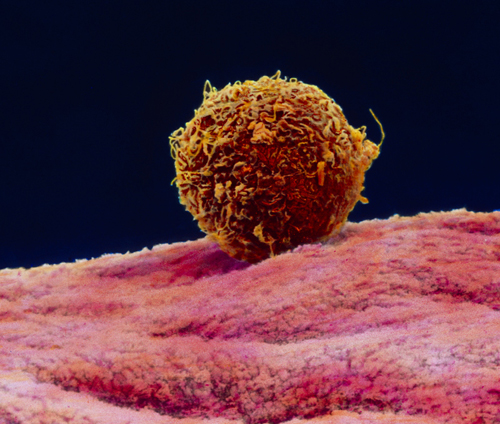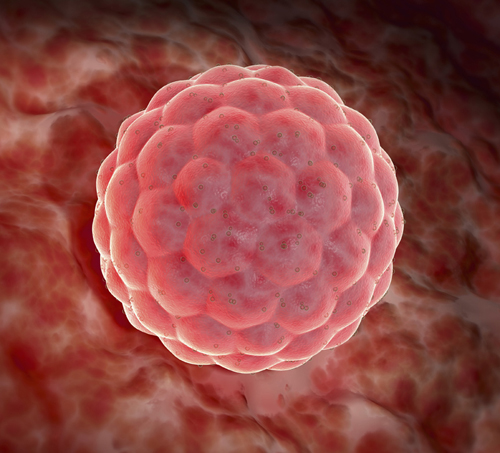You are 2 Weeks and 6 Days 260 days to go…
Your reproductive organs undergo complex processes that will enable your body to maintain the pregnancy.
What’s happening inside
The blastocyst prepares to embed itself in the lining of the
uterus—the endometrium. Once it is completely implanted—usually around
seven days after fertilization—the pregnancy will become established.

If you have conceived, the ball of cells
known as the blastocyst that will eventually form the fetus will now be
preparing to embed in the lining of your uterus, and the placenta will
be starting to form.
Before this happens,
however, there is another important change going on. After you ovulate,
the empty ovarian follicle develops into a structure called the corpus
luteum (which means, literally, “yellow body”). This small, fluid-filled
sac becomes increasingly “vascular,” developing blood vessels and
beginning to produce the hormone progesterone. This is required to
create mucus to allow your fertilized egg to survive, and build up the
lining of your uterus, in which the blastocyst will soon imbed .
The corpus luteum
also produces a little estrogen. By about 8–12 weeks of pregnancy, your
placenta will take over the production of progesterone, but the corpus
luteum continues to play a small role in hormone production until about
six months, when it usually shrinks away.
The miracle of conception
When you consider the multitude of events
that have to fall neatly into place before a baby is conceived, it’s
hard to believe that anyone can become pregnant. No wonder they talk
about the miracle of life!
To become pregnant the following have to happen:
Your hormone balance must be correct for the egg to develop.
Ovulation must take place: if you don’t release an egg, there is no way for fertilization to occur.
You need to have sex
at the right time in your menstrual cycle; sperm can last about three
days in healthy cervical mucus, but if your timing is off, egg and sperm
are unlikely to meet. In some cases there may be only two or three days
each month when you can conceive.
Your partner needs to produce plenty of good, healthy sperm that can penetrate your cervical mucus to reach the egg.
When the egg has been fertilized, the blastocyst has to implant securely in the lining of the uterus.
The right levels of the hormone progesterone must be produced by the corpus luteum to maintain the pregnancy.
… Doctor
| Q: |
Should I stop taking medication in case I’ve conceived?
|
| A: |
Many medicines are safe to take, but some are not, or have not
been fully evaluated. This last group includes many antihistamines for
allergies, over-the-counter sleeping pills, and many analgesics.
If you’ve
accidentally taken an over-the-counter remedy that’s not considered
appropriate for use in pregnancy, you’re unlikely to have done any harm
with just one dose. However, seek medical advice if you’re concerned.
If you need to
continue using a medicine in pregnancy, ask if it’s safe to do so. While
pharmacists are well-informed on all medicines, your doctor is the best
person to consult on prescription-only drugs.
|

You are 3 Weeks Exactly 259 days to go…
It’s a week since the egg was fertilized and it now implants in your uterus, where it will soon develop into an embryo.
What’s happening inside
The blastocyst is firmly embedded in the lining of the uterus.
Once this has happened, the placenta (the temporary organ that supplies
the growing embryo with oxygen and nutrients) will begin to develop.

Around seven days after fertilization,
the blastocyst implants in the lining of the uterus. The outer cell
layer, no longer protected, is able to attach to the lining of the
uterus. The lining is now more receptive and has undergone changes that
make it more “sticky” to aid attachment. The blastocyst erodes cells to
sink beneath the surface.
What was originally a
single outer layer of cells now transforms into two layers. The
outermost layer of cells creates space by eroding the lining, and it
secretes hormones. These hormones inform your body that you’re pregnant
and stimulate the uterus to support the pregnancy rather than shed its
lining in what would normally be your period. The innermost cell layer
will become the placenta and the amniotic sac that encloses the embryo.
Within the blastocyst there is an inner cell mass that will form the
embryo.
Stretch and unwind
It can help to relax in this interim period,
before you do a pregnancy test. Fill some time by getting in shape with
these simple stretches. Getting into the habit of doing these exercises
now will help your body deal with the increased demands once you know
you’re pregnant. Stretch before and after exercising to prevent muscle
strain.
To do a back stretch,
get on all fours and lower your bottom toward your feet while
stretching your arms out on the floor in front of you. Lower your
forehead as far as you can, keeping your neck and back aligned, and
stretch your arms as much as you can. Inhale slowly and then relax your
back and arms as you exhale. Inhale and exhale 10 times.

To do a leg stretch,
sit on the floor and stretch your left leg in front of you. Using your
left hand take hold of your left foot for a few seconds. If you can’t
reach your toes, don’t worry. Inhale to begin and exhale as you stretch.
Repeat with your right leg.
